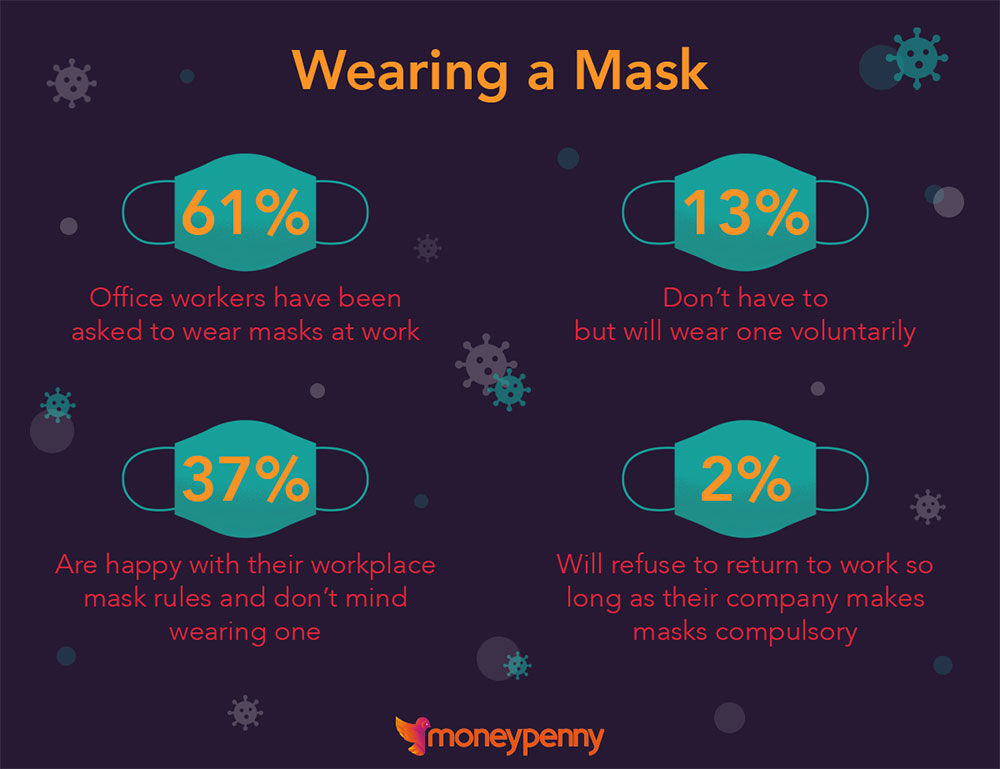Moneypenny, the outsourced communications provider surveyed 1,000 UK office workers to find out how they feel about returning to the office.
A new survey of 1,000 office workers reveals how the nation is feeling about getting back to work. With many returning after months in isolation, anxieties are expected to be high.
The research carried out by Moneypenny, the outsourced communications provider, showed that almost a half (45%) of the office workers surveyed said they already returned to the office, with a further 31% saying they’ve been given the go ahead to return within the next 1-4 months.
However, around 5% said their employers have stated they won’t return to work until January 2021 at the earliest, and around 18% have not been given a date to return as of yet.
The majority of those that stated they are already back in the office were situated in the North East and the East Midlands, with East England and Scotland having the highest percentages of those with no return date as of yet.
Furthermore, the findings showed that over a third (34%) of workers are entirely comfortable returning to the office. However, 48% admitted to having some concerns about COVID risks.

When looking at the regional data, around a quarter of those in Yorkshire said that they were not comfortable with returning to the office and with a further look into why this might be, the research revealed that only 15% of Yorkshire residents said that their workplace has made masks compulsory in all areas of their offices, the lowest percentage of any region in the UK.
However, those in Northern Ireland were the most comfortable about returning to the office, with around 47% saying they had no issue with getting back to work.
With a return to the office, commuting also has to be taken into consideration, with public transport being of higher risk than other forms of transport.
The data shows that the majority (66%) of office workers will be choosing to take their own cars to work to avoid contamination.
Shared transport, such as car shares and public transport had the lowest percentages. Interestingly, Manchester had the lowest percentage of workers stating they would be using public transport, with only 7% claiming it to be their commuting method of choice, compared to the 16% national average.
Over a third (37%) of office workers said they had no problems with wearing a face mask. However, a further 36% said they would find it too much to do a whole day of work wearing a mask and 13% said they don’t mind wearing a mask at work short-term, but would be less happy if the policy became long-term.
In larger cities, masks are slowly becoming compulsory. 40% of those in London stated that their companies have already made masks compulsory for all areas of the office. Those in Leicester, the city with the first regional specific lockdown, have the highest rate of compulsory mask policies, with 58% saying that the policy had been enforced in their place of work already.
The national average of those that said mask wearing was voluntary and that they were not going to wear one was 26%, however in Wales, 36% said that they were going to choose not to wear a mask. Those in Yorkshire, the region that said they felt least comfortable with returning to work, were one of the most likely to wear a mask with 27%, even though it is not compulsory.
The study also highlighted that 61% of workers have already been introduced to staggered start, break and finish times, in order to keep workers away from each other as much as possible.
However, 16% said that they still don’t trust their colleagues to social distance in the office, with Scotland’s workers being the least trusting. Those in the North East were the most trusting of their colleagues, with a huge 64% saying they trusted their teammates to keep to strict guidelines.
A further 11% said that they would report those that didn’t comply with the social distance rules when in the office, with the West Midlands having the highest number of workers willing to report those that don’t keep to the new policies.
The overall feeling is fairly mixed, with an equal number of workers flitting between being fine with sharing equipment and refusing to share office equipment and stationery. Some offices have even gone as far as banning the sharing of equipment completely, with 31% of those surveyed saying their management would not allow it.
Even the tea rounds have been called into question. Overall, 48% said they will make teas and coffees for their colleagues, however, of those, 40% will make coffees only for colleagues that are close to them and they trust them.
15% of those questioned said that their management does not allow them to make tea or coffee for their colleagues and 38% strictly stated they will not do tea rounds at all.
Over half of East England office workers say they will now only make drinks for themselves, in contrast with the West Midlands, where 42% are most likely to do the rounds for their colleagues.
Scott Ellyson, CEO of East West Manufacturing, brings decades of global manufacturing and supply chain leadership to the conversation. In this episode, he shares practical insights on scaling operations, navigating complexity, and building resilient manufacturing networks in an increasingly connected world.